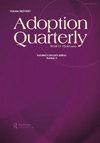Theory and Development of the Diasporic Identity Scale with Adopted Korean Americans
IF 0.6
Q3 SOCIAL WORK
引用次数: 1
Abstract
Abstract Drawing upon diaspora scholarship and social identity theory, we propose a new psychological construct – diasporic identity – to capture how transnationally adopted individuals draw meaning from their migrations, the communities that they construct, and their relationships with their homeland. We describe the development of a new self-report measure – the Diasporic Identity Scale (DIS) – to assess this construct, and we provide initial psychometric evidence for it using a sample of transnationally adopted Korean American adolescents (N = 117). The DIS comprises two dimensions: solidarity (r =.90) and homeland attachment (r =.88). Diasporic solidarity is a sense of within-group empathy and emphasizes community building; homeland attachment captures a desire to return to the homeland and for cultural roots. Exploratory factor analysis supports the two-factor structure. We also provide initial evidence for convergent, discriminant, and concurrent validity. Supplemental data for this article is available online at收养韩裔美国人双孢子身份量表的理论与发展
摘要基于散居学者和社会认同理论,我们提出了一种新的心理结构——散居认同,以捕捉跨国收养的个人如何从他们的移民、他们构建的社区以及他们与祖国的关系中获得意义。我们描述了一种新的自我报告测量方法——双孢子虫身份量表(DIS)——的发展,以评估这一结构,我们使用跨国收养的韩裔美国青少年样本(N = 117)。DIS包括两个维度:团结(r=.90)和家园依恋(r=.88);故乡依恋捕捉了一种回归故土和寻找文化根源的愿望。探索性因素分析支持双因素结构。我们还提供了收敛、判别和并发有效性的初步证据。本文的补充数据可在线获取,网址为
本文章由计算机程序翻译,如有差异,请以英文原文为准。
求助全文
约1分钟内获得全文
求助全文
来源期刊

Adoption Quarterly
SOCIAL WORK-
CiteScore
1.60
自引率
12.50%
发文量
3
期刊介绍:
Adoption Quarterly is an unparalleled forum for examining the issues of child care, of adoption as viewed from a lifespan perspective, and of the psychological and social meanings of the word "family." This international, multidisciplinary journal features conceptual and empirical work, commentaries, and book reviews from the fields of the social sciences, humanities, biological sciences, law, and social policy. In addition to examining ethical, biological, financial, social and psychological adoption issues, Adoption Quarterly addresses continuity in adoption issues that are important to both practitioners and researchers, such as: negotiation of birth and adoptive family contact.
 求助内容:
求助内容: 应助结果提醒方式:
应助结果提醒方式:


